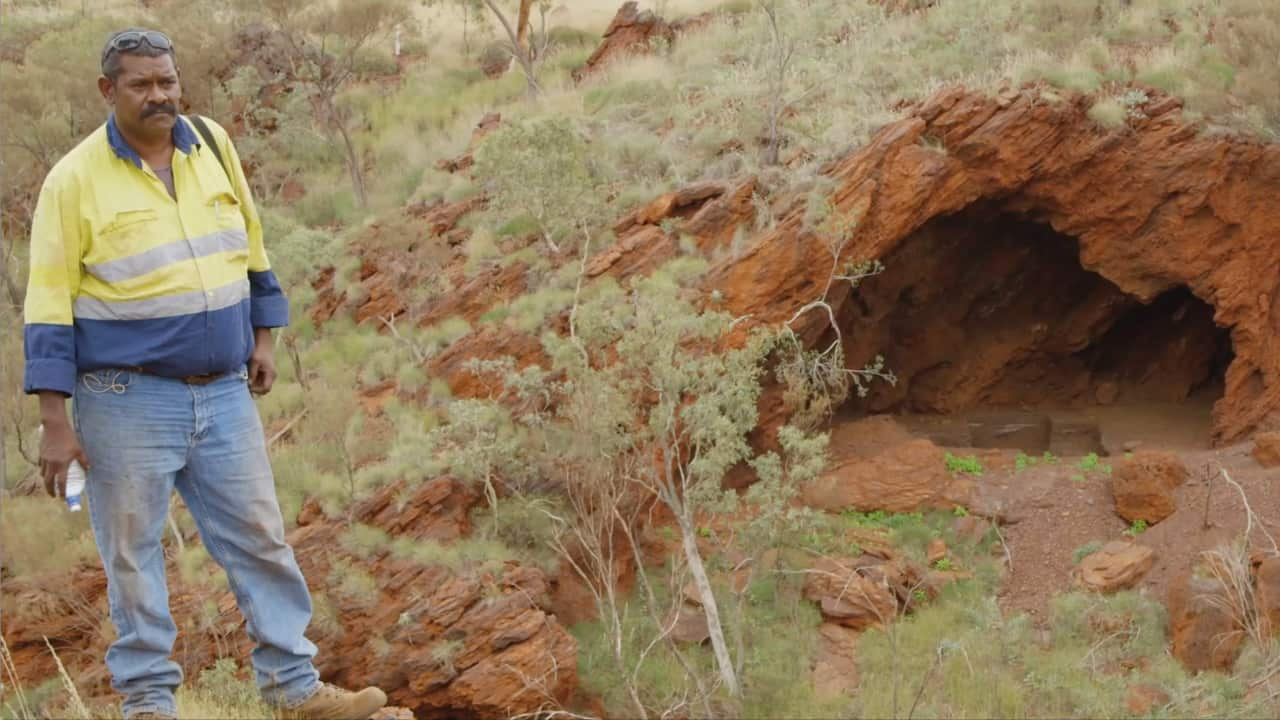Puuti Kunti Kurrama and Pinikura (PKKP) Traditional Owners have told a parliamentary inquiry the destruction of ancient rock shelters at Juukan Gorge has left a "gaping hole" in their ability to pass on cultural knowledge to future generations.
PKKP director Burchell Hayes described the moment he found out about the blast to a parliamentary inquiry into the destruction of the 46,000 year old caves in the Pilbara.
"When I heard of the disaster I was driving from Port Hedland with four of my grandsons," he said.
"Their presence had a huge impact on how I felt. It felt really terrible as a grandfather to know that I was not able to preserve the heritage that was on loan to me.
"We feel immense grief, guilt and a sense of failure at not being able to exercise this responsibility to protect Country.
"We will do our utmost to recover what we can from the rubble of Juukan Gorge. We will make sure that this place forever remains important as an anchor to our ancestors." The inquiry heard that PKKP learned of the plans to blow up the site just days before its eventual destruction.
The inquiry heard that PKKP learned of the plans to blow up the site just days before its eventual destruction.

Juukan Gorge after the blast by Rio Tinto. Source: PKKP Aboriginal Corporation.
PKKP cultural heritage manager Heather Builth said she reached out to Rio Tinto to request a visit to the site and was told it was to be blown up in two days time.
What eventuated, she said, was "nine days of absolute hell for us trying to save this place".
Ms Builth said she thought she could save the caves, but didn't know that despite promises to cease work, Rio Tinto was still loading explosives into the area.
"They said everything would cease, we would discuss the situation, we were having all these high level meetings and considering the safety aspects," she said.
"At the same time as they were having these discussions they were still loading up the blast holes, but we didn't know that then."
PKKP concerns for the Juukan Gorge sites and access to other culturally significant areas in the same location were evident in a 2015 video released to media after the PKKP gave evidence to the parliamentary inquiry on Monday.
The video had already been tendered to the Joint Standing Committee on Northern Australia.
'Insensitive'
Rio Tinto has previously told the inquiry that they had four options to access iron ore in the area, three of which would avoid the destruction of the rock shelters, but they chose the fourth option.
PKKP chief executive Carol Meredith said the PKKP weren't aware there was more than one way to proceed.
"Rio certainly did not advise PKKP that there were four options that they could have chosen from and even more offensive, that was only discovered when we heard it stated at this inquiry so there has been some shock at hearing that news to the group," she said.
Following the destruction at Juukan Gorge, the PKKP and Rio TInto agreed to a moratorium on mining activity in the area.
Ms Builth said PKKP had only recently learned the Fortescue Metals Group (FMG) had applied on September 27 to convert its prospecting license to a mining license on land within the moratorium area.
The six month moratorium negotiated by PKKP with Rio expires in January. PKKP are now rushing to complete ethnographic studies before it expires.
Ms Builth called the move by FMG "insensitive at best, unconscionable at the worst".
"They've gone ahead and applied for a mining license over an area that we've put a moratorium on because of its high cultural sensitivity," she said.
"We didn't even know that. We found that out two days ago so we're pretty upset with FMG at this stage as well."
The inquiry will continue on Tuesday.










